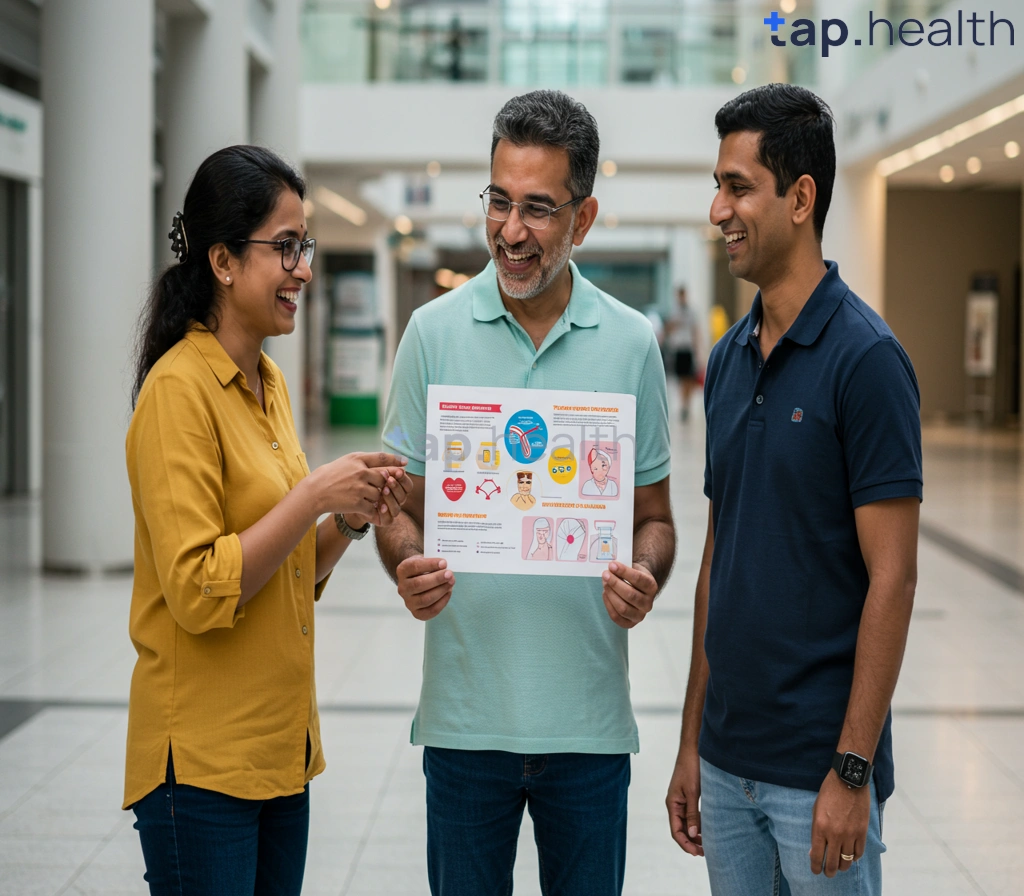Table of Contents
- Understanding Diabetes Myths: Separating Fact from Fiction
- Organ Donation and Diabetes: Addressing Common Concerns
- Can People with Diabetes Donate Organs? Dispelling Myths
- Debunking Diabetes Myths: The Truth About Organ Donation
- Diabetes & Organ Donation: A Guide to Facts and Resources
- Frequently Asked Questions
- References
Living with diabetes or considering organ donation? You’re probably surrounded by myths and misconceptions that can be confusing and even scary. That’s why we’re here to help! This blog post focuses on Debunking Diabetes and Organ Donation Myths: The Facts You Need. We’ll tackle common misunderstandings head-on, providing you with clear, accurate information to empower you to make informed decisions about your health and the lives of others. Let’s separate fact from fiction and get you the real answers you deserve.
Understanding Diabetes Myths: Separating Fact from Fiction
The Shocking Truth About Undiagnosed Diabetes
Did you know that a staggering 50% of diabetes cases worldwide remain undiagnosed? This alarming statistic, highlighted in the International Diabetes Federation’s Diabetes Atlas, is particularly relevant in Indian and tropical countries, where diabetes prevalence is high. Many individuals live with the condition unaware, leading to delayed treatment and serious health complications. This underscores the importance of dispelling common myths surrounding diabetes and organ donation.
Myth 1: Diabetes Automatically Disqualifies You From Organ Donation
This is simply false. While diabetes can affect organ health, it doesn’t automatically rule out organ donation. The suitability of an organ is assessed on a case-by-case basis by medical professionals. Many individuals with well-managed diabetes are still excellent candidates for organ donation. The focus is on the overall health of the organ, not solely on the presence of diabetes.
Myth 2: Diabetes Makes Organ Transplantation Impossible
Again, this is a misconception. While diabetes might increase the risk of complications post-transplant, it doesn’t prevent transplantation entirely. With proper management and post-transplant care, individuals with diabetes can successfully receive organ transplants and lead fulfilling lives. The success of the transplant depends on various factors, and diabetes is just one aspect.
Myth 3: People with Diabetes are Too Sick to Donate Organs
This is a harmful generalization. Many individuals with diabetes maintain healthy lifestyles and manage their condition effectively. Their organs can be just as viable for donation as those of individuals without diabetes. The key is early detection and proper management of the disease. Regular check-ups and adherence to a healthy lifestyle are crucial, not only for personal well-being but also for the potential to become an organ donor.
Taking Action: Get Screened and Informed
In India and other tropical countries, regular health check-ups are essential for early detection of diabetes and other health conditions. Don’t let myths about diabetes prevent you from living a healthy life and potentially saving others’ lives through organ donation. Get screened for diabetes today and educate yourself about the facts. For more information on the relationship between diabetes and obesity, read our blog: Understanding the Link Between Diabetes and Obesity. Also, it’s important to dispel the myth of diabetes transmission; learn more in our article: Can Diabetes Be Transmitted? Understanding the Facts and Myths.
Organ Donation and Diabetes: Addressing Common Concerns
Many people with diabetes in India and other tropical countries harbor misconceptions about organ donation, often hindering their ability to give the gift of life. A common concern revolves around the suitability of organs from individuals with diabetes. While it’s true that diabetes can impact organ health, it doesn’t automatically disqualify someone from being a donor. Careful assessment by transplant professionals determines organ suitability on a case-by-case basis. The key is early and open communication with your family and healthcare providers about your wishes.
Diabetes and Organ Health: Separating Fact from Fiction
It’s crucial to understand that the presence of diabetes doesn’t necessarily mean your organs are unsuitable for donation. Factors like the type of diabetes, its management, and the overall health of the individual are all considered. For instance, we know that smokers with diabetes face a two times higher mortality rate due to cardiovascular issues. This highlights the importance of overall health management. However, even with these challenges, many individuals with well-managed diabetes can still be organ donors. Similar considerations apply to blood and plasma donation; learn more about donating blood with diabetes by reading Can a Diabetic Person Donate Blood: Guidelines & Facts.
Addressing Concerns Specific to Tropical Climates
In tropical regions, certain diseases may be more prevalent, potentially influencing organ suitability. However, this doesn’t preclude donation. Advanced medical testing and rigorous screening protocols are in place to identify any potential risks and ensure the safety and viability of donated organs. Open communication with your healthcare provider can address any specific concerns related to your health and geographic location. If you’re considering plasma donation, Can You Donate Plasma If You Have Diabetes? provides valuable information.
Taking Action: Registering as an Organ Donor
Registering as an organ donor is a selfless act that can transform lives. In India and across tropical countries, the need for organ donation significantly outweighs the supply. By openly discussing organ donation with your family and registering your decision, you empower them to act on your wishes and potentially save multiple lives. Take the step today to learn more about organ donation programs in your region and register your decision. Your gift can make a profound difference.
Can People with Diabetes Donate Organs? Dispelling Myths
Addressing Common Concerns in India and Tropical Countries
Many believe diabetes automatically disqualifies someone from organ donation. This is a dangerous misconception, especially considering that 61% of people with diabetes in the world are aged between 20-64 years, a prime organ donation age group, according to data from the International Diabetes Federation. The reality is far more nuanced. While diabetes can affect organ health, it doesn’t automatically rule out donation. The suitability of an organ depends on various factors, including the type and severity of diabetes, overall health, and the specific organ in question.
Evaluating Organ Donation Eligibility
The assessment process involves a thorough medical evaluation by transplant specialists. They carefully consider the individual’s blood sugar control, the presence of complications like kidney disease or neuropathy, and the overall health of the potential donor organ. In India and other tropical countries, where diabetes prevalence is high, raising awareness about these facts is crucial. Many potential donors may be unnecessarily excluded due to misinformation. Open communication with transplant teams is key. Don’t hesitate to ask questions and clarify any doubts about your eligibility. Understanding the nuances of diabetes and its impact on donation is vital, much like understanding the different ways diabetes can affect other bodily functions, as discussed in our article, Can Diabetes Be Transmitted Sexually? Myths vs. Facts Explained – Tap Health.
The Importance of Accurate Information
The myth that diabetes prevents organ donation prevents many people with diabetes from considering this life-saving act. This misinformation is especially detrimental in regions like India and other tropical countries, where the need for organ donation is significant and the prevalence of diabetes is high. By dispelling these myths, we can empower more people to explore the possibility of organ donation and potentially save countless lives. It’s essential to consult medical professionals to receive personalized guidance based on individual health conditions and circumstances. Don’t let misinformation hold you back from making a difference. For those with Type 1 diabetes considering other forms of contribution, you might find our article on blood donation helpful: Can Type 1 Diabetics Donate Blood?
Debunking Diabetes Myths: The Truth About Organ Donation
Addressing the Misconceptions
Many people with diabetes in India and other tropical countries harbor misconceptions about organ donation. A common myth is that having diabetes automatically disqualifies someone from being an organ donor. This is untrue. While diabetes can affect organ health, it doesn’t always preclude donation. The suitability of organs is determined on a case-by-case basis by medical professionals, considering the overall health of the individual and the specific condition of the organs. The significant global economic burden of diabetes, estimated at $760 billion annually, underscores the importance of addressing these myths and promoting organ donation.
Diabetes and Organ Donation: A Realistic Perspective
Another misconception is that the diabetes medication a person takes will negatively impact the potential recipient. Again, this is often not the case. Doctors carefully assess the donor’s medical history, including medication, to determine the viability of the organs. In many instances, organs from individuals with well-managed diabetes can be successfully transplanted. It’s crucial to remember that the decision to donate rests with the family and medical professionals, who weigh the potential benefits against any associated risks. For more information on effectively managing your diabetes and improving your overall health, see our guide on 10 Proven Tips for Effective Diabetes Management.
Promoting Organ Donation in India and Tropical Countries
Open communication about diabetes and organ donation is vital within families and communities in India and other tropical countries. This means dispelling myths and promoting awareness of the organ donation process. By understanding the facts and speaking openly, we can help alleviate the suffering caused by organ failure and potentially save lives. Registering as an organ donor is a powerful way to make a difference. Let’s work towards a future where more people understand the reality of diabetes and organ donation, and where more lives can be saved. Avoiding common mistakes in diabetes management is crucial. Learn more about 5 Common Mistakes People Make in Managing Diabetes to optimize your health and well-being.
Diabetes & Organ Donation: A Guide to Facts and Resources
Many people in India and other tropical countries believe that having diabetes means you cannot become an organ donor. This is a common myth. The truth is that diabetes does not automatically disqualify someone from donating organs.
While diabetes can increase the risk of complications like kidney disease—about 30% of people with diabetes develop diabetic nephropathy—each potential donor is evaluated individually. Some organs may still be healthy and suitable for donation.
Understanding the Evaluation Process
When doctors assess a potential donor, they look at:
-
The overall health of the person.
-
The condition of each organ.
-
The type and severity of diabetes.
-
Any effects diabetes has had on other organs.
This means even if a person has diabetes, certain organs (like the corneas, liver, or sometimes lungs) may still be donated. The decision is always made by the transplant team after careful medical evaluation.
The Importance of Organ Donation in Tropical Regions
In countries like India, the demand for organ donation is very high. Thousands of people suffer from organ failure, but the waiting list for transplants is long.
By spreading awareness and clearing up misconceptions about diabetes and organ donation, more people may choose to donate. This can save countless lives and improve healthcare outcomes, especially in tropical regions where lifestyle diseases like diabetes are common.
Taking Action: Your Role in Saving Lives
Here’s how you can make a difference:
-
Talk to your family and friends about your decision to be an organ donor.
-
Register as an organ donor in your region.
-
Encourage others with diabetes to learn the facts and not let myths hold them back.
Your choice to donate organs, even while living with diabetes, can be a life-changing gift for someone in need.
✅ Key Takeaway: Having diabetes does not automatically prevent you from donating organs. The evaluation is done case by case, and your decision could save lives.
Frequently Asked Questions on Debunking Diabetes and Organ Donation Myths: The Facts You Need
Q1. Can I donate my organs if I have diabetes?
Having diabetes doesn’t automatically disqualify you from organ donation. Doctors assess each case individually, considering your overall health and how well your diabetes is managed. Well-managed diabetes may not prevent donation.
Q2. What factors affect whether someone with diabetes can donate organs?
Several factors are considered, including the type of diabetes, how well it’s managed, and the presence of any related complications. The overall health of the potential donor’s organs is the primary concern.
Q3. Why is it important to address misconceptions about diabetes and organ donation?
Many people mistakenly believe diabetes prevents organ donation, leading to fewer life-saving donations. Correcting this misconception can significantly increase the number of available organs for those in need.
Q4. How can I learn more about organ donation if I have diabetes?
Open communication with your healthcare provider is crucial. Discuss your diabetes management and your interest in organ donation to get personalized advice and address any concerns.
Q5. What role does diabetes management play in organ donation eligibility?
Effective diabetes management is vital. Good control of blood sugar and minimizing complications improve the health of your organs and increase the likelihood of successful donation.
References
- A Practical Guide to Integrated Type 2 Diabetes Care: https://www.hse.ie/eng/services/list/2/primarycare/east-coast-diabetes-service/management-of-type-2-diabetes/diabetes-and-pregnancy/icgp-guide-to-integrated-type-2.pdf
- Your Guide to Diabetes: Type 1 and Type 2: https://www.niddk.nih.gov/-/media/Files/Diabetes/YourGuide2Diabetes_508.pdf



